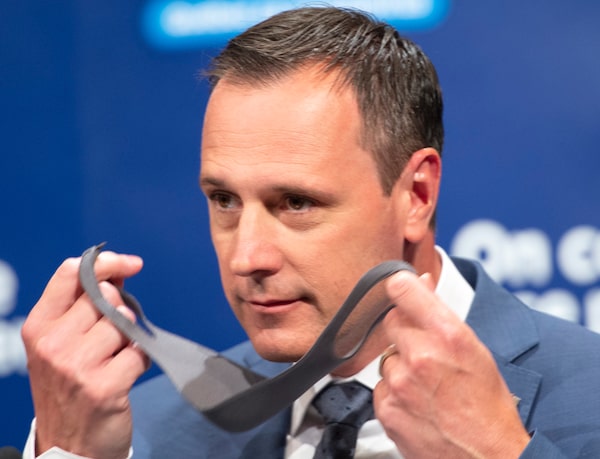
Quebec Education Minister Jean-François Roberge, seen here in Montreal on Aug. 10, 2020, said the province is building on the successful, limited return to school last spring outside the greater Montreal region.Ryan Remiorz/The Canadian Press
Quebec has adjusted its back-to-school plan 18 days before classes start, dropping a requirement to create mini-bubbles of six children within classrooms and making masks mandatory for students in Grade 5 and above while in common areas.
The province will go ahead with a compulsory return to school when most classes resume on Aug. 28, with online options only for children with medical exemptions and those forced to stay home because of illness or quarantine. Senior high-school grades will have some online classes.
The moves on Monday contrasted with Ontario’s plan for mandatory classroom masks for Grade 4 and above and its voluntary return to school, which allows parents to keep children home for online learning. In Quebec, parents will need a doctor’s note.
Quebec Education Minister Jean-François Roberge said the province is building on the successful, limited return to school last spring outside the greater Montreal region. That reopening kept class sizes to a maximum of 15, and had several dozen isolated cases among students and school staff, and one major outbreak within a class. No one was hospitalized. The fall return will not cap class size, but will include measures to isolate classes from each other.
Quebec’s Director of Public Health, Horacio Arruda, who approved the reopening plan, said it balances trying to limit the spread of the novel coronavirus with public-health concerns over childhood development. He added that all-day masks are not feasible for children. “Wearing a mask all day is difficult for adults, imagine for children,” he said.
Education experts and pediatricians have pushed hard for the resumption of school, although some epidemiologists have sounded alarm over the patchwork provincial back-to-school plans. Ottawa introduced guidelines on the weekend, after most provinces had developed the bulk of their plans.
Many parents say Quebec’s plan leaves many unanswered questions. “I really don’t know how it’s all going to work,” said Nancy Wildgust, a Montreal-area parent with children entering kindergarten, Grade 3 and Grade 11. “How does it work for after-school programs? If my kid is suspected of having COVID, do his siblings’ classes also stay home? What happens to the classes that stay home when people work?”
Mr. Roberge said local school administrations will reveal many more details in coming days. Local public-health authorities will decide on class and school closings on a case-by-case basis. The minister promised parents will be informed any time cases arise.
The absence of some details has triggered anxiety among parents. Wayne Radford, a Montreal-area parent of two elementary school aged children, said a small group chat he started turned within a week into a Facebook page with 2,400 members, many of whom question the plan.
He said most parents must return to work and are resigned to sending children back to school. Others are planning to homeschool – an involved process that is not a short-term fix. The final group, which includes Mr. Radford, is unsure what to do, he said.
“There is a lot of anxiety. I’d say about 85 per cent of people are just freaking out,” he said. “I’ve posted resources for mental health, told people to call a friend who is not so invested. I can understand why the government is going ahead, but the lack of detail isn’t helping.”
Olivier Arvisais, a professor at the University of Quebec at Montreal who specializes in education in emergency situations, a subject that usually applies to international humanitarian crises, said many governments have a communications problem regarding schools.
“I think they’re making the right decision. Health can’t just be about the coronavirus. An extended break from school for children with difficulties can set them back two years. They get overloaded and never catch up,” Prof. Arvisais said. “But it’s fundamental in education to have buy-in from parents. If parents don’t buy in, they don’t send their kids. The ministry needs to win parents over, and there seems to be a problem with that.”
Égide Royer, a psychologist who specializes in student success and retention, said it is time to get beyond debates over masks and hand sanitizer in schools.
“This is a Phase 1 plan: getting back to school safely. Now we need Phase 2. How are we going to make sure these children succeed in school?” Dr. Royer said. “There are little kids going into Grade 2 who don’t know how to read because of the time they missed. There are 16- and 17-year-olds who were barely holding on who we are going to lose. What are we going to do about them?”
Our Morning Update and Evening Update newsletters are written by Globe editors, giving you a concise summary of the day’s most important headlines. Sign up today.